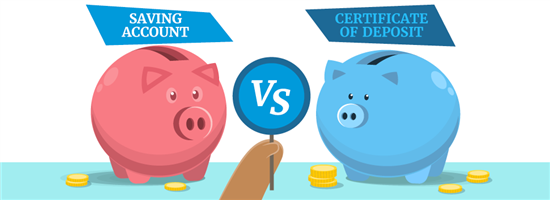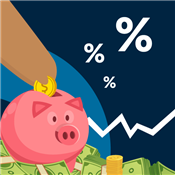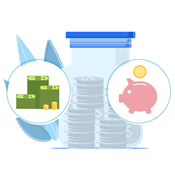Savings Accounts vs CDs
Ad Disclosure: This article contains references to products from our partners. We may receive compensation if you apply or shop through links in our content. This compensation may impact how and where products appear on this site. You help support CreditDonkey by using our links.
Savings accounts and CDs are often compared, but which should you choose? Learn the difference and which is best for you before stashing your cash.
 |
Savings accounts and CDs are both safe places to park your idle cash while earning interest.
But how do you know which one is right for you?
Before opening an account, learn the difference between savings and all types of CDs. Plus, find out when you might want to consider a money market account instead.
What is a savings account?
A savings account is a type of bank account similar to a checking account. The main difference is that savings accounts pay a higher interest rate in exchange for offering less flexibility.
For example, banking regulations limit the number of monthly withdrawals you can make from a savings account to 6.
Any more withdraws result in a fee or have your account automatically downgraded to a checking account, depending on the bank.
Here are the key takeaways for savings accounts:
- Pays a slightly higher interest rate than a checking account
- Limits you to 6 withdrawals per month (but no restrictions on size of withdrawals)
- Withdrawals above the monthly limit incur a fee or account downgrade
- Low minimum deposit requirement (if any)
- FDIC-insured up to $250K per person, per bank
This is a special type of savings account that offers an even higher interest rate than a standard one (sometimes 10X or 15X higher). The drawback is that you'll need to open this account through an online bank, as local brick-and-mortar banks usually don't offer them.
Who is a savings accounts good for?
Based on the above, you've probably guessed that savings accounts are a good choice if:
- You make very few withdraws per month (less than 6)
- You want a higher interest rate than a checking account (and who doesn't want that?!)
Even though withdraws from a savings account are limited, savings accounts still keep your money more liquid (i.e., accessible) than a CD. Find out how CDs compare below.
This lets you earn more interest while keeping your checking account for the monthly bills so you can still make as many withdrawals as you want.
What is a CD?
A Certificate of Deposit, or simply "CD," is a type of bank deposit that offers a higher, fixed interest rate than a savings account.
In exchange for a better interest rate, money is "locked up" at the bank for a pre-determined length of time (which you can choose).
Unlike a checking or savings account, you won't have access to this money until the CD matures.
Below are the key points to know:
- CDs are offered at a variety of maturities ranging from just 3 months to as long as 10 years
- Interest rates are usually fixed and increase along with the maturity of the CD (rates currently vary from 0.3% to more than 1% APY)
- Early CD withdrawals are not allowed or incur a steep penalty
- Minimum deposit requirements usually start at $500
- FDIC-insured up to $250K per person, per bank
Who is a CDs good for?
CDs pay higher interest than savings accounts, which make them a good choice if:
- You have a decent chunk of money (at least $500) to put away
- You know you won't need the money for a certain amount of time.
Just make sure you are okay with it being inaccessible for the entirety of the term. The fees for early withdrawal (if allowed) can be steep.
Different types of CDs
Now that you know the differences between CDs and savings accounts, let's take a look at some of the different variations of CDs.
Liquid (or no penalty) CDs: Most Flexible
As the name implies, these CDs allow you to withdraw your money early if you choose.
Not surprisingly, the trade-off is that these will pay a lower interest rate than typical CDs. This is because the bank is willing to pay you more for guaranteeing them access to your money.
Step-Up CDs: Rate Increases Over Time
These CDs come with a pre-determined schedule of interest rate increases.
For example, the rate might start out lower than a standard CD and then increase above it after 6 to 12 months.
Bump-Up CDs: Take Advantage of Rising Rates
Your money is still "locked in" with a Bump-Up CD. However, if current CD rates increase after you open yours, this type will allow you to switch to the higher rate.
As a result, the rates offered on Bump-Up CDs are higher than a Liquid CD, but still lower than your standard CD.
Jumbo CDs: Best for Large Sums of Money (>$50K)
Some banks will also offer what's called a Jumbo CD. These come with higher interest rates than a standard CD.
The trade-off is that they have a high minimum deposit requirement (usually $50K to $100K).
Compare Savings Accounts
High-Yield Savings Premier - 5.31% APY
- No account activity or maintenance fees
- $500 minimum opening deposit
- FDIC insured
Discover® Online Savings - $200 Cash Bonus
To qualify for Bonus: Apply for your first Discover Online Savings Account, enter Offer Code CY624 at application, deposit into your Account a total of at least $15,000 to earn a $150 Bonus or deposit a total of at least $25,000 to earn a $200 Bonus. Qualifying deposit(s) may consist of multiple deposits and must post to Account within 45 days of account open date. Maximum bonus eligibility is $200.
What to know: Offer not valid for existing or prior Discover savings customers, including co-branded, or affinity accounts. Eligibility is based on primary account owner. Account must be open when bonus is credited. Bonus will be credited to the account within 60 days of the account qualifying for the bonus. Bonus is subject to tax reporting. Offer ends 09/12/2024, 11:59 PM ET. Offer may be modified or withdrawn without notice. See advertiser website for full details.
CIT Bank Platinum Savings - 5.00% APY
- 5.00% APY with a balance of $5,000 or more
- 0.25% APY with a balance of less than $5,000
- $100 minimum opening deposit
- No monthly maintenance fee
- Member FDIC
Compare CD Rates
Certificate of Deposit
- 4.70% APY for 12-month term
- 4.40% APY for 18-month term
- 3.75% APY for 36-month term
- 3.75% APY for 5-year term
9-Month High-Yield CD - 5.05% APY
- No fees
- $1 minimum deposit
- 24/7 online access to funds
- FDIC insured through California Bank of Commerce
CIT Bank Term CDs - Up to 3.50% APY
- Up to 3.50% APY
- $1,000 minimum opening deposit
- No monthly maintenance fee
- Member FDIC
| Term | CD Rates |
|---|---|
| 6 Month | 3.00% APY |
| 1 Year | 0.30% APY |
| 13 Month | 3.50% APY |
| 18 Month | 3.00% APY |
| 2 Year | 0.40% APY |
| 3 Year | 0.40% APY |
| 4 Year | 0.50% APY |
| 5 Year | 0.50% APY |
What About Money Market Accounts?
A money market account is very similar to a savings account.
They both offer competitive interest rates, but sometimes you might find the rate on a money market account is a little higher.
On the flip side, the minimum required balance on a money market account is generally higher than a savings account, so that's the trade-off for the better interest rate.
Other than the above, savings and money market accounts are, more or less, the same. Both accounts come with the same activity restrictions, limiting the number of monthly withdrawals to six.
And both are eligible for FDIC insurance, protecting your money in the event of a bank failure.
Pros
- Sometimes the rates are better than a savings account
- Debit cards and checks allow easy access to your money
Cons
- Money market accounts have higher balance requirements (or else impose fees)
- Limited transactions (just as with a savings account)
Bottom Line: Which one should you choose?
If you have at least $500 sitting around and are sure you won't need for at least 3-6 months, then you should probably go with a CD.
They are likely to offer you the best interest rate and the lack of liquidity shouldn't be an issue. If possible, aim for a CD with a longer term because it will get you a higher rate.
If you don't think you'll need your money in the short term but aren't entirely sure, then it's probably safer to go with a savings account instead.
In the event that you need the money sooner than later, you can access it fairly quickly (within 1-2 business days). Plus, you'll have up to 6 withdrawals. Be sure to also look at high yield savings accounts, which gives you a better interest rate than a standard savings.
You wouldn't want to choose a CD and have to withdraw the money early and get stuck paying a penalty fee.
On the other hand, if you can find a money market account that offers a higher rate than your savings account and you have enough cash to meet the minimum balance requirements, then you should probably go with the money market account instead.
Write to Andrew Fitzgerald at feedback@creditdonkey.com. Follow us on Twitter and Facebook for our latest posts.
Note: This website is made possible through financial relationships with some of the products and services mentioned on this site. We may receive compensation if you shop through links in our content. You do not have to use our links, but you help support CreditDonkey if you do.
|
|
| ||||||
|
|
|
















